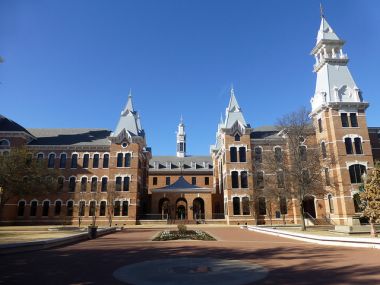What does the Supreme Court gay marriage ruling mean for Christian colleges?

America's Christian colleges are coming to terms with the country's Supreme Court ruling that same-sex marriage is now legal across the country – and legal options to put pressure on them to conform are being explored with the creation of a new equality campaign.
The ruling has put pressure on colleges which ban same-sex relationships, with state funding potentially at risk if they refuse to extend the same benefits to same-sex married couples as to heterosexual ones.
Three colleges – Baylor University in Texas, Hope College in Michigan and Belmont University in Tennessee – have changed their policies regarding homosexuality recently. Baylor dropped references to "homosexual acts" in its conduct policy, though it maintains its commitment to "purity in singleness and fidelity in marriage between a man and a woman as the biblical norm".
Now Hope College has said that it will extend spousal benefits to same-sex married couples. Its president, John Knapp, wrote in a statement: "In employment policy and practice, Hope College has always followed the state's legal definition of marriage. Spouses are eligible for benefits, so long as their marriage is legally recognized the state of Michigan."
Belmont University, formerly affiliated to the Tennessee Baptist Convention, already offered legally married same-sex couples equal benefits before the Supreme Court decision. The Roman Catholic Notre Dame University pledged to extend health care and other benefits to same-sex couples when Indiana introduced same-sex marriage last year. A spokesperson said then: "Notre Dame is a Catholic university and endorses a Catholic view of marriage. However, it will follow the relevant civil law and begin to implement this change immediately."
Gordon College in Massachusetts resolved in May to retain its code banning sexual relations outside heterosexual marriage and to keep language specifically directed at homosexual acts. However, it said in a statement: "We recognize that students at Gordon who identify as LGBTQ or experience same-sex attraction have often felt marginalized and alone, and recognize the pressing need for a safe campus environment for all students."
A campaign by the Americans United for Separation of Church and State launched after the Supreme Court decision seeks to thwart colleges and other religious institutions seeking exemption from the implications of the ruling. Its "Protect thy Neighbor" project is aimed among other things at preventing policies that would "allow government-funded grantees and contractors to use religion as a reason to hire, fire, and withhold services in taxpayer-funded programs".
According to the Christian Post, its executive director Rev Barry Lynn said: "We will work to put a stop to reckless definitions of 'religious freedom' that are really just excuses to infringe on the rights of others."
He continued: "I think that the issue with [LGBT] rights is a little bit different [from race]. The evolution of the issue is moving at least as quickly as we have moved in the area of race and that this is a national dialogue that ought to begin about, should in fact benefits be given to educational institutions that do in fact discriminate."
Lynn said: "Even now, I would not want to be a person at a fundamentalist academy who is trying to defend the practice, that is taking a reasonable amount of government funds and refusing to allow a same-sex married couple to live in the married student housing. I think even now, that would be on the edge of the indefensible."











